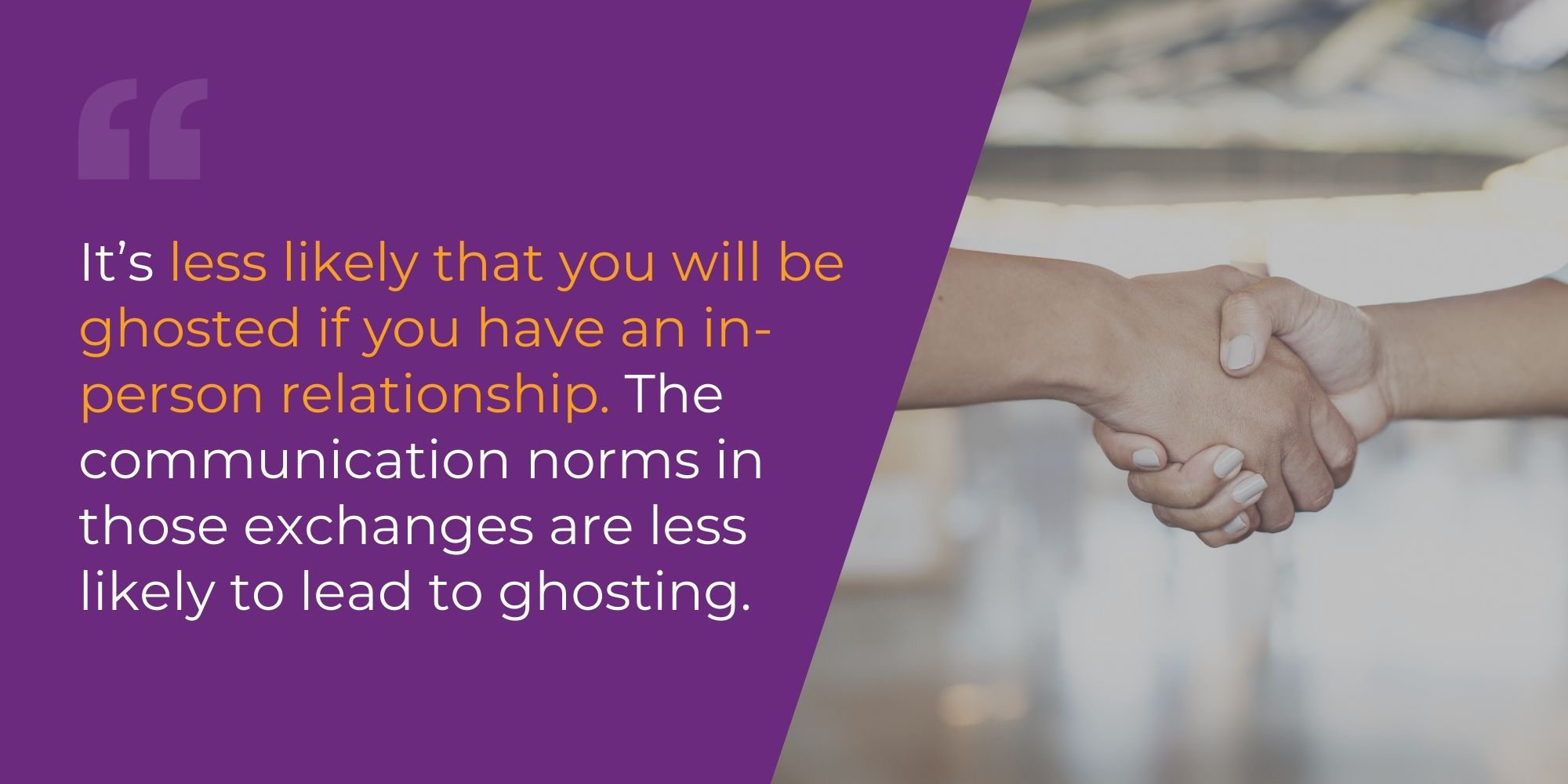Learn more about Colin Shaw: Join over 80,000 people on our LinkedIn Newsletter list or visit our website for more great podcast episodes.
Listen to the podcast:
I have been ghosted. I find this strange since I am married and have been for decades.
However, ghosting happens in other arenas, too. It’s a work colleague ghosting me; no matter how I try to contact him, I hear nothing in return. It feels like he disappeared off the face of the earth. Since ghosting is a relatively new phenomenon, we should talk about it here, too.
Ghosting isn’t uncommon, particularly for people using online dating platforms. You might have heard stories where two people are communicating on one of them, sometimes for a long time, and then, out of nowhere, one of them stops. The other person wonders what happened, probably forever.
So, for some of us at a certain age, breaking off a relationship without even so much as a “Goodbye!” sounds astonishing. However, it is common today. Technology enables ghosting. With many online relationships, it’s easy for someone to terminate communication comprehensively and irrevocably.
Avoiding Conflict Motivates Ghosting
The primary motivation for ghosting is conflict avoidance. So, suppose you aren’t physically interacting with someone, meaning you didn’t meet them in real life, like at school or work. In that case, your interactions are probably texting, emailing, or social media exchanges. Stopping these communications altogether is much more comfortable than talking about it face to face, and you are insulated against the risk of conflict.
Sometimes, these situations arise in other areas of one’s life. For example, my friends engage in similar activities when I invite them for a monthly guys’ night out. I texted them where we should meet and when and asked them to reply if they could come.
I am always disappointed. It’s twelve people, and only two to three respond routinely. The others do not.
My unresponsive mates might have a good reason for not responding right away. Maybe they need to talk to their spouse, or they have a business travel situation they need to sort out first. That is understandable. However, not responding at all is not.

(It’s also not ghosting to ignore my invitation. My mates are not completely cutting off the relationship. It is rude, though…)
I could apply social pressure to get a response. If I send out a text to the group that confirms that a couple of people will join and then ask the remaining few in the text group what they think, it could inspire activity.
The problem here could be the medium of communication. If I had invited them face to face or called them and they picked up the phone, my friends would feel more social pressure to respond to my invite, even if it is to say, “Can I get back to you?” Using text creates an option to have more distance and relieves some social pressure to respond.
Ghosting is a symptom of the change in conversational norms. Those of us who had years of communicating before these mediums came into fashion might cling to the old ways of doing things longer than those who didn’t. We respond because we feel it is the polite thing to do. We are probably the same people who would break up with someone in person because that’s the way we thought relationships were supposed to end.
However, people who have always communicated via text or these other mediums might have another set of norms. For example, if the norm is that a non-response is a response, then people who have accepted this as a fact might think that a person on the receiving end of a non-response should get the message. However, people who don’t accept this norm might not get that message. Therefore, it could be that we are in an awkward transition period where some people ghost and some respond, so there are mixed feelings about ghosting.
However, it could be that in a few years, ghosting is the way it’s done. That said, I do worry that some civility is lost here.
I have heard that some job candidates have been ghosted by the companies they are interviewing, which is wrong. I find that appalling. However, this behavior is becoming the norm for some companies.
The reverse is true, also. Some candidates have ghosted companies that they lose interest in, which is crazy, too. Companies have complained that job candidates ghosted them in the interview process, which they don’t appreciate.
These new norms are surprising to me. But they could also be a form of renegotiation about what is expected in communication. Moreover, it’s not settled yet. So, there are likely other instances where non-response is acceptable, which is very interesting.
Prospecting in the Days of Ghosting
My son Ben posted on LinkedIn about the norm for contacting people who reach out on LinkedIn. One fellow said he had been trying to contact Ben on the platform for weeks with an opportunity, and Ben told him his message was lost in the shuffle. Ben’s contact seemed to think the onus was on Ben to respond. That not responding was discourteous.
But is it?
I have a lot of followers on LinkedIn, and quite a few of them reach out to me to sell me something. I learned over the years not to respond. So, if there were a product or service that I could benefit from, I would miss out on it with my non-response. However, in this case, the norm on LinkedIn—and in sales solicitations in general—is that I don’t have to respond. Ben doesn’t either.
So, how should one contact someone regarding a product or service?
My advice would be to begin by learning more about the individual. Researching how your product or service would benefit them and what they like and would respond to improves your chances of making a real connection.

Of course, researching to that level requires a much larger time commitment. Mass emails to everyone you can think of would be faster. But is that approach more effective? Not likely. The tradeoff is that spending more time on the front end with research results in a higher response rate than a mass email and an increased likelihood of moving a prospect forward in the sales funnel.
Regardless of how you contact people, frequently considering communication norms is essential. How are people communicating across the various channels available to them, and what are the norms of that channel? Knowing the platforms is necessary so you know the ways that are more likely to get a response. There might be modes of communication that are more personal and will evoke a different set of response norms.
Also, remember that it’s less likely that you will be ghosted if you have an in-person relationship. The communication norms in those exchanges are less likely to lead to ghosting.

Additionally, remember that as these norms shift, there may be opportunities for you to distinguish yourself in business by adhering to an older set of norms. For example, if you interview for a job, sending a thank you note for an in-person meeting with an individual at an organization after a job interview might be the norm. Furthermore, not sending one might signal a lack of interest in moving forward. So, even if you aren’t really the thank-you-note type, you should probably send one if you want the job.
As an organization, it is also essential to distinguish your company regarding the candidate experience. Tell them so if the position fills with another candidate or you decide not to move someone forward. Communicating with the candidate preserves the relationship for a future opportunity. Sure, it might be considered old-fashioned by some people’s norms, but it can also reap relational and reputational benefits. Being the place that is responsive and doesn’t ghost candidates can be an excellent buzz for your recruitment efforts—and candidates’ perception of your company.
The golden rule comes into play here, too, meaning that you should treat other people in these situations like you would want to be treated. If you feel tempted to ghost people rather than have an awkward conversation, consider how you feel when people ghost you.
Finally, please know that if you contact me on LinkedIn about things we talk about on the podcast or to share your opinion on one of my newsletters, I welcome that feedback and often respond. I probably won’t if you contact me with a product or service you want to sell me.
Thanks for reading, we appreciate you! Get access to your free ebook here, and why not tell a friend?

This review sums it up: “The dynamic between the two hosts absolutely makes this podcast. Each brings a unique take on the topic, their own perspective, and plays off each other’s sense of humor. I come away after each episode with a feeling of joy and feeling a bit smarter”.
Listen to the podcast: https://beyondphilosophy.com/podcasts


